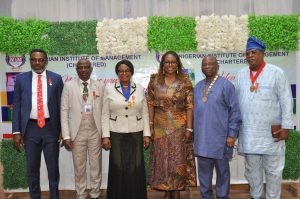
The Nigerian Institute of Management Chartered (NIM) has urged the Federal Government to deploy policies that focus on stimulating entrepreneurship growth to increase the Ease of Doing Business (EoDB) ranking and develop the nation’s economy.
Dr Christiana Atako, Acting President, NIM, made the plea at the opening ceremony of the NIM 2022 Annual Conference on Monday in Ibadan with the theme: “Public Policy Management and Entrepreneurship Development in Nigeria”.
Atako said the choice of theme was to spur the government to put in place appropriate policies to drive entrepreneurship development for the Nigerian economy to make meaningful progress.
According to her, the public policies of many developing economies like Nigeria is currently shifting emphasis from Small and Medium Enterprises (SME) to entrepreneurship.
This, she said, was to ensure that SME policy does not run parallel with the entrepreneurship policy.
She said that stimulating entrepreneurship and small business activities must, however, sit high on the agenda of developed and developing countries alike.
“Although, Nigeria is still plagued by many development challenges, the country is naturally endowed with entrepreneurship opportunities.
“The realisation of full potential of these opportunities has been dampened by the adoption of inappropriate industrialisation policies at different times.
“Several policy interventions that were aimed at stimulating entrepreneurship development via SME promotion, based on technology transfer strategy, have failed to achieve the desired goals.
“Instead, it has led to the most indigenous entrepreneurs becoming distribution agents of imported products as opposed to building in-country entrepreneurial capacity for manufacturing, mechanised agriculture and expert services.
“The institutional framework set by public policy affects the prevalence and performance of productive entrepreneurship, which should be rewarded and successful ventures must also have the incentive to continue renewing themselves,” Atako said.
In his remarks, Prof. Habu Mohammed, Department of Political Science, Bayero University, Kano, described the country as the most promising business environment, due to its vast population and huge market potentialities in the West African sub-region.
Mohammed said that no matter how attractive a country’s market was, it could not conversely attract business, unless conditions necessary for undertaking business activities were made easier.
He said that given the country’s current ranking on the EoBD, the challenges associated with Nigeria’s business environment, which prevented Foreign Direct Investment, must be addressed.
Mohammed specified that factors such as power supply, insecurity, poor infrastructure, multiple taxation, policy conundrum and external influences must be tackled to achieve high profile on the Ease of Doing Business ranking.
He, however, said that should the current pattern of investment in infrastructure continue with more projects completed, Nigeria would drastically reduce the challenge of road infrastructure and ease its business environment.
“The good factor about the country is that, in comparison with its sister African states, the country is relatively advanced in infrastructure, such as road, rail and ICT networks with a high extensive coverage of its national territory.
“The challenges of Nigeria’s EDB can be surmountable when there is a political will to act rationally, quickly and effectively to address the myriad of challenges that impair the attainment of business made easy in the country.
“The practice of multiple taxation and the phenomenon of policy inconsistency, scarcity of foreign exchange, unfavorable tariffs, bureaucratic bottlenecks, insecurity and the dearth of useful incentives for business have to be duly addressed to promote EDB in Nigeria.
“The prospects of the Nigerian economy to develop from its current state to a major business entity with a capacity to attract investors depends largely on sustainable security, peace and hospitable environment,” Mohammed said. (NAN)



